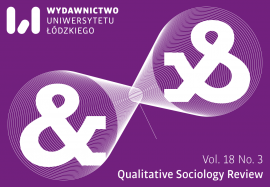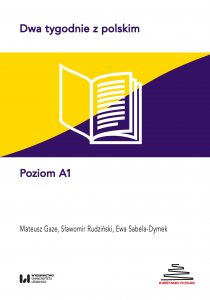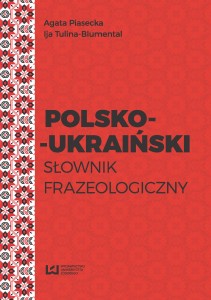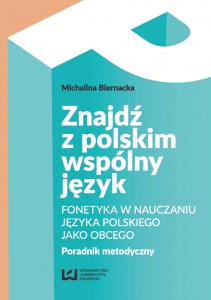Qualitative Sociology Review | Vol. 18 No. 3
Opublikowano: 9 sierpnia 2022

Qualitative Sociology Review jest anglojęzycznym kwartalnikiem Wydawnictwa Uniwersytetu Łódzkiego, który podobnie jak “Przegląd Socjologii Jakościowej” podejmuje refleksję nad jakościową i interpretatywną drogą uprawiania socjologii. Redakcja dąży do współpracy, integracji i rozwoju środowiska naukowego, a swoją inicjatywę podejmuje w imię wartości takich jak indywidualność, równość, tolerancja, społeczność, nauka, ludzkość.
W numerze:
Robert Prus
Despite the striking affinities of classical Greek and Latin rhetoric with the pragmatist/interactionist analysis of the situated negotiation of reality and its profound relevance for the analysis of human group life more generally, few contemporary social scientists are aware of the exceptionally astute analyses of persuasive interchange developed by Aristotle, Cicero, and Quintilian.
Having considered the analyses of rhetoric developed by Aristotle (384-322 BCE) and Cicero (106-43 BCE) in interactionist terms (Prus 2007a; 2010), the present paper examines Quintilian’s (35-95 CE) contributions to the study of persuasive interchange more specifically and the nature of human knowing and acting more generally.
Focusing on the education and practices of orators (rhetoricians), Quintilian (a practitioner as well as a distinctively thorough instructor of the craft) provides one of the most sustained, most systematic analyses of influence work and resistance to be found in the literature.
Following an overview of Quintilian’s “ethnohistorical” account of Roman oratory, this paper concludes by drawing conceptual parallels between Quintilian’s analysis of influence work and the broader, transcontextual features of symbolic interactionist scholarship (Mead 1934; Blumer 1969; Prus 1996; 1997; 1999; Prus and Grills 2003). This includes “generic social processes” such as: acquiring perspectives, attending to identity, being involved, doing activity, engaging in persuasive interchange, developing relationships, experiencing emotionality, attaining linguistic fluency, and participating in collective events. Offering a great many departure points for comparative analysis, as well as ethnographic examinations of the influence process, Quintilian’s analysis is particularly instructive as he addresses these and related aspects of human knowing, acting, and interchange in highly direct, articulate, and detailed ways.
Acknowledging the conceptual, methodological, and analytic affinities of The Institutio Oratoria of Quintilian with symbolic interactionism, an epilogue, Quintilian as an Intellectual Precursor to American Pragmatist Thought and the Interactionist Study of Human Group Life, addresses the relative lack of attention given to classical Greek and Latin scholarship by the American pragmatists and their intellectual progeny, as well as the importance of maintaining a more sustained transcontextual and transhistorical focus on the study of human knowing, acting, and interchange.
Scott Grills
Envisioning success and its pursuit as an enduring feature of human group life, this paper examines success as a humanly constructed and realized social process. As framed herein, success represents the attribution by some audience of qualities associated with achievement, attainment, and/or accomplishment to social act(s) and/or social objects. Consistent with symbolic interactionist approaches to the study of deviance, success is not a quality of the situation at hand, but rather is audience-dependent. Therefore, while the social construction of success may be evidence-based, what is defined as successful outcomes and what constitutes evidence of success is subculturally located. Drawing on extended ethnographic research, an application of alternate definitions of success is examined in the context of those participating in an electorally unsuccessful political party—the Christian Heritage Party of Canada. Specifically, this paper examines the definition of success in terms of political influence, providing political alternatives and demonstrations of religious faithfulness as strategies of success-claiming. Framing success in process terms, this paper examines the trans-contextual and trans-historical qualities of “doing success” as a feature of everyday life.
Types of Rationality in Discourses on Work in (Post)Transformation Poland
Konrad Kubala
Rationality is the key concept for understanding the reproduction of social life in the era of reflexive modernization. A fusion of lessons learned from the constructivist view of the world and analysis of the hermeneutic category of pre-understanding has become the basis of my belief that rationality is nowadays the basic modal concept, and the forms of its existence shape the order of social life. In my research practice, rationality has become a link between my interest in work and the theory of social order development. In this paper, I briefly present the relations between the notion of rationality and the theory of reflexive modernization. Then, I present my research path and the tools used in the analyses. The most important part is devoted to the effects of the conducted research. I classify and describe the types of rationality present in discourses on work in Poland. The discourses of politicians, experts, and the so-called “ordinary people” were analyzed.
“Being a Yid”: Jewish Identity of Tottenham Hotspur Fans—Analysis and Interpretation
Bogna Wilczyńska
Tottenham Hotspur football fans are victims of regular antisemitic abuse from opposition fans. They are commonly referred to as “Yids.” Interestingly, Tottenham supporters appropriated the Jewish image and embraced it as part of their fandom identity. They have been using symbols and content associated with Jewish identity, even if their club has never been a Jewish organization, and the vast majority of them are not Jewish. The objective of this paper is to describe and explain the main characteristics of the phenomenon of what I call the “Jewish identity” of the fans. The research presented in this paper was based on sociological and anthropological qualitative methods; above all—in-depth interviews with the fans and participant observation in the stadiums during Tottenham games. The analysis and interpretation of the material collected for the study allowed me to explore the questions of “how,” “why,” and “what” happens in the stadiums (and outside the stadiums) from the perspective of the fans in the context of their “Jewish identity.” I particularly focus on the mechanism Tottenham supporters use to manage and fight stigma and investigate how different groups of fans have created different narratives around Jewish identity to make it meaningful for them.
Alexis Sossa Rojas
It is known that rates of participation in sports and physical activities among older adults decrease as they get older. This article focuses on the experience of the aging body at the gym, and it is one of the few that focuses on a little-studied group of frequent gym-goers. Based on an ethnographic work of more than two years in Amsterdam, I explain the goals of three older adults who frequently work out, what their relationships with the gym and their bodies are, and why they are interested in training in gyms. This article seeks to contribute to discourses on health, sport, and aging and, at the same time, to explain some of the advantages of qualitative studies in understanding the experience of aging and training in gyms.
Mehmet A. Balkanlioglu, Zeynep Ozinci
This qualitative study investigates the relationship between intimate partner violence (IPV) and the duration of marriage in the Turkish context and explores spouses’ perceptions, experiences, and solutions concerning IPV. Participants were thirty Turkish couples married for twenty or more years. Data collection tools were a semi-structured interview, observation notes taken during the interview, and a socio-demographic questionnaire. Data analysis showed that psychological violence was the most reported type, while sexual and economic violence was not reported in long-term marriages. Only a few instances of physical violence were reported during the first years of marriage. Regarding gender, the perpetrators of physical IPV were all men except for only one case, while both men and women were the perpetrators and victims of psychological violence. Spouses’ proposed solutions for IPV were identifying the determinants of IPV, encouraging religious and values education, solving economic problems, building communication and patience, learning respect, responsibility, and love; or getting divorced. The study suggests some implications for professionals.
Zapraszamy do lektury!
Komentarze
Ten post dostępny jest także w języku: angielski





